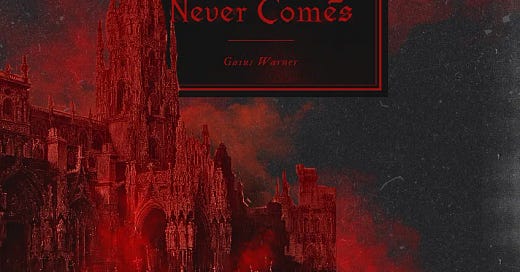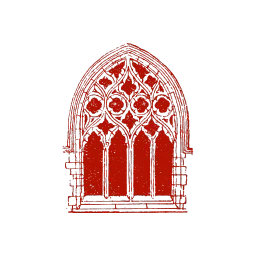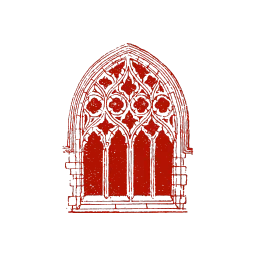Editor’s Note:
Welcome back to “If Morning Never Comes,” a serial adventure of gothic peril from
and proudly published byIf this is your first time with this serial story of adventure and peril, start at the beginning! - Episode One | In Which: We Meet the Ashley Family
If you got lost, visit the Table of Contents! - If Morning Never Comes
Charles heaved another stone onto the pile. If you could call it that. He had not carried enough for them to start stacking yet. Rocks. A vampire wanted to take him hunting and that confounded German had him moving rocks.
He shook out his wrists as he turned around and walked back to the house. There stood a dishearteningly large pile of medium-sized stones. Too heavy to carry more than one at a time, but not so big that he had to strain himself; small enough that he could carry them the full distance but not small enough for him to do so quickly. His mind was free to wander, but he could not ignore the tension in his forearms either.
As he neared the pile he picked out his next target. He chose one of the bigger ones – might as well get them out of the way early. He put his hands around the stone and lifted. He tried to hoist it up, but it put him off balance when he took a step, so he let it hang in his extended arms. He scrunched up his shoulders so that it rested against his stomach, and he began to trudge back. He felt like a woman carrying a child at full term. If that were the case, he would be experiencing the miracle of birth at least one hundred times today.
His thoughts returned to that morning. He had hurried to see Herr Stryker early after the previous night’s turn of events. The old man had opened the door and demanded an explanation for Charles abandoning his post.
“Mr. Raines called on us last night,” Charles had gasped out. “He wants to take me hunting. I think he’s going to try to kill me.”
Stryker nodded and said, “Finally!” He put his arm around the mystified younger man and steered him into the house.
As Herr Stryker cracked eggs into a pan, Charles narrated the story as best he could, doing his best to provoke a concerned reaction out of his serene companion. When none came, he wrapped it up.
“Anyway,” he watched Stryker move the eggs onto a plate, “he wants us to go stalking on Monday.” Stryker found a fork, not looking at him yet, “And I don’t know what to do, Herr Stryker.”
The German laughed and faced him, turning his eggs with a fork so the yolk spilled out, “What else, Charles? You must go.”
At that moment Stryker’s warning that he would not hesitate to send Charles to his death rang clear in Charles’ mind. He sat down as Stryker did.
“But–” he stopped as his friend bowed his head to pray. When he finished and began to eat, Charles continued, “But Herr Stryker, he’ll kill me!”
Stryker chuckled again and wiped yellow yolk out of his mustache with a napkin. “No Charles, he won’t.”
Charles tossed his hands and laughed, “There is not a single reason why he shouldn’t.”
“Yes there is,” said Stryker.
“He’s a vampire, Herr Stryker! He’s been known to rip open sheep. That’s all I am to him – just another animal to feast on.”
“Undoubtedly,” said Stryker. “But he won’t kill you. At least not this time.”
Charles sensed the old man knew something he did not so he said nothing more.
“Can you tell me why?” prompted Stryker.
Charles began to complain, “Herr Stryker—"
“What,” interrupted the German, starting in on his sausages, “is the vampire’s plan?”
Charles paused. “I don’t know.”
“Correct,” said Stryker, gesticulating with a skewered sausage on the end of his fork, “We don’t know what he’s up to yet. All we can do is examine his behavior thus far and try to piece together what we do know.” He took a bite. “So what has been his behavior thus far, Charles?”
Charles thought and said, “Well, he’s been killing sheep.”
“Forget the sheep for now. What is the most conspicuous move Mr. Raines has made?”
“He hosted the ball?” ventured Charles.
Stryker nodded and chewed, “That’s right. Do you remember how he introduced himself?”
Charles scoffed, “Oh yes. He was a right ponce about it.”
“He was,” said Stryker. “He was very concerned that everyone think highly of him, yes?”
“Especially Eleanor,” remembered Charles.
“Do you have it yet?”
Charles did not like the implication that he was too thick to understand the situation, but had nothing to say. And yet Georg Stryker’s insistent look did not allow him to back out of the question.
“He wants everyone to like him?” he offered.
“Yes. Your family most of all,” Stryker added. “Which would be rather difficult for him to accomplish if he ripped out your heart and drank your blood during an afternoon picnic.”
Charles understood, but was not convinced, “I don’t know that they’d miss me that much, Herr Stryker.”
The German only laughed. Charles tried to wheedle at least a little sympathy out of the man, but none seemed imminent. After he cleared his plate, Herr Stryker left the room without so much as a reassuring grasp of Charles’ shoulder. He scrambled out of his chair and followed the bobbing bald head through the open door.
Stryker stamped off to the side of the house, the grass making soft sounds under his boots. Charles followed close behind.
“Herr Stryker,” he offered, “would it not be a good idea for you to teach me a few defensive, eh – maneuvers, before Monday. You know, in case...”
“Heh!” laughed Stryker, “There is nothing I could teach you in such a short amount of time that could prepare you for that. However, it is fortuitous that you came by today.”
“So you’re not going to teach me anything?” rasped Charles.
“Oh, don’t worry. You’ve got a lesson coming,” grinned Stryker.
Charles did not like the sound of that. Before he could inquire further, they came around to the back of the cottage. The familiar twisting tree stood in the distance. And by the house itself stood an ominous stack of stones.
“The quarrymen brought them yesterday,” Stryker explained. “I’ve got them looking out for more dead animals on the moor.”
Charles’ eyes widened, “Have they found any?”
“One,” said Stryker. “They’re convinced a demon is haunting the moor. Perceptive.” He sighed, “Something isn’t right, Charles. This isn’t like them.”
“The quarrymen?” asked Charles.
“The vampire. He’s being patient,” Stryker shook his head. “They’re never patient. The female’s rapid strategy with you is much more typical. But this business with the animals, it’s different. I don’t like it.”
Georg Stryker had a remarkable ability to set aside his thoughts and feelings to focus on the task at hand. In an instant, the care fell from his face and his smug cheerfulness returned. “But I have learned to wait. That is one of our great advantages. Watching, waiting, stalking, praying and then striking,” he clapped his hands together, “at just the right moment!”
Charles had learned so little of the actual hunt since that first night, he hung on every word that smelled of strategy or tactics. But Stryker put a knobbly finger in his face.
“You, however,” he said, “are not patient. And if you are not patient then you will play right into their hands.”
Charles didn’t much care for the accusation, “I’m...” he hesitated, losing confidence as he spoke, “I’m patient.”
“Heh!”
The two stood by the pile of rocks. Stryker grabbed the topmost and held it up. The man’s appearance truly belied his strength.
“There is a long, proud tradition of training new hunters. It will be my privilege to pass on to you secrets that have been guarded by hunters for a thousand years.” He dropped the rock with a clack. “But today we will try something that I made up a few days ago.”
A number of ideas ran through Charles’ head, none of them pleasant.
“You will carry these rocks to the tree,” said Stryker, gesturing to the windblown sentinel in the near distance.
Charles paused, “That’s it?”
Herr Stryker smiled.
And so it was that Charles found himself performing a meaningless task on what was fast turning from a clear morning to a hazy afternoon. The job took hours, and there was no speeding it up. At first, Charles had tried to see the value in it. He could find none. Then he had been angry, but that had worked itself out. Now he was simply doing the job, slow and repetitive as it was.
And as he did, the far pile grew while the other shrank. He began to notice the difference and his energy picked up. Not to the point of excitement, but it was enough to keep him going. Finally, he scooped up the last of the white rocks, walked the distance and shot-put it onto the pile. It clattered down and rolled off to the side, so he pushed it with his foot until it touched the bottom. As he turned to come back he saw Stryker standing by the house with two cups in his hand.
One was for him. He drank the water with gratitude, although he wasn’t really tired or sore. The task had been menial, but not difficult. After a few moments of silence, Stryker spoke.
“Well done, Charles.”
Charles nodded as he finished another swig.
“Do you know what I’m going to ask you to do next?”
Charles closed his eyes and brought the cup down. He handed it to his teacher.
“Yes.”
“Bring them back.”
“I know.”
“Think about the problem,” Stryker advised. “Engage your mind while your body is busy.”
Charles nodded. He was resigned to his fate. “I’d better get to it.”
“Yes, you’d better,” agreed Stryker. He turned to go, stopped and called out, “By the way! I’m expecting company later, you’ll want to look presentable.”
“Presentable?” Charles called back, but the German had rounded the house. He ran a hand over his face, tasting the chalky dust of the rocks. He spat out the grit and made his way back to the tree.
The task took so long that Charles could set his watch by the cycle of his emotions. He had shaken out of his lethargy and drifted into despair, but he reacted against that and found his enthusiasm for the hunt, which faded into anger at Herr Stryker for leaving him to do something so inane instead of training him like he had promised.
He imagined the German charting a plan of attack, cackling as he wrote Charles out of the proceedings. He would find someone else more capable to handle the real work, and let Charles sweep up the blood after or something. He composed speeches demanding more responsibility and denouncing Herr Stryker for his duplicity. The thought of that mustache dripping with tears of remorse gave him the strength to continue.
But he knew he was being petulant. He always knew when he was acting foolish, but most of the time he saw no reason to do otherwise. Today was different. All of his drive and energy were aimed at earning the respect of Georg Stryker. If it took carrying rocks, then rocks he would carry. If Stryker expected him to quit, he would be waiting a long time.
Besides all that, lives were on the line. His sisters, his mother, even Amelia. He had not forgotten about her. And of course he could add his own to that list. As he deposited another stone, he felt the first real wave of fear shudder down his spine. He was going to be alone on the moor with Edgar Raines. What was he thinking? A gust of wind blew, chilling his sweat-soaked back. He thought he heard a sound carried on the air. He turned around.
A simple, one-horse carriage was parked in front of the cottage. It belonged to Mr. Tarrant. And there was his daughter, walking around the corner, waving and smiling.
Charles felt his heart leap at the sight, only to crash and look for a place to hide when he realized how he looked. He had removed his jacket and was wearing only his trousers and a shirt, open at the top few buttons. He was wet with sweat, his hair looked shrubbish. He tried to remember if he had been waving his arms or speaking out loud as he daydreamed. He walked the distance to the house again, where she stood in a lavender dress. She clutched something in her hands in front of her, looking, all in all, very pretty.
He came close and called her name.
She called back, a hand at her mouth, “Charles!” Her voice smiled. “What are you doing?”
“Erm,” Charles came close and took her hand, “Carrying rocks, Miss Tarrant.” He kissed her hand. She laughed.
“I can see that. Whatever for?”
Charles put his hands on his hips and then crossed his arms when he realized that the motion opened his shirt even more. Jenny maintained eye contact, but a little laugh in her eyes and the slightest blush gave him cause to believe that she had noticed.
“Whatever for? Yes, well. You’ll have to ask Herr Stryker about that, won’t you?”
Jenny giggled and put a hand to her mouth. She was trying to be nice, but her laughter did not embarrass Charles. He laughed himself and hung his head in mock shame.
“Are you working for him, then?”
“In a manner of speaking,” Charles answered. “More of a partnership, I suppose.” He gestured to the tree, “I’m to carry the rocks back from that tree.”
Jenny looked and her eyes lit up, “Oh, what a splendid tree!”
Charles teased, “Miss Tarrant, is there anything at all that you do not find splendid?”
“Hush,” she scolded. “Pick up another rock and I’ll walk with you.”
Charles laughed and followed orders. As they walked together, he gathered that Jenny’s father had some business with Herr Stryker, and she had accompanied his representative at the German’s insistence. Charles smiled at that. He was learning more and more that Stryker was not quite as crusty as he seemed.
As they walked, they talked. No serious topics, nothing frightful or severe. Silly things. They teased and laughed and danced around the edge of propriety. Long after they reached the tree, they were carrying on with jokes that would not be funny to anyone else who might hear them. The moor was dreary and clouded, but Charles felt like sunshine.
He picked up a stone with a flourish to please his audience as she settled down on top of the pile and opened the book she was carrying. She took out a pencil. The book’s pages were blank, and she set herself to sketching. Charles returned to his work. Jenny was not much for conversation while so occupied, so he had several opportunities to observe the way she perched on the pile of rocks.
Sweet and unconcerned like a little girl, and yet as demure as aa woman. Charles felt his heart beat as he watched her. Every time he deposited his stone, he turned around and saw her again, growing closer with every step. He couldn’t tear his eyes away. Then he was afraid. Afraid that she would find out just how attached he was becoming with every trip back and forth. He felt vulnerable and exposed, like a hare that has wandered onto a hunter’s path. He was at her mercy now, if she only knew. And yet the fear was familiar; it reminded him of his drive to defeat Edgar Raines and his admiration for Herr Stryker. As she brushed a lock of hair behind her ear, he felt all of these disparate passions unite into a compelling drive to protect her, to fight for her, to have her throw herself into his arms as he fended off the terrors of the night. She sighed as he approached the tree and looked up with a smile. Her eyes were a beautiful brown.
“Alright then, Master Ashley, that will do for now. Come have a seat,” she directed in a stern voice edged with impertinence.
“There now, Miss Tarrant, that’ll be enough cheek from you!” he returned with a pointed finger. She giggled through her teeth and covered her face with her book for a moment. She seemed to enjoy pushing him to put her in her place that way, though always in jest. Charles walked over to where she sat atop the rocks. She was a wee bit taller than him where she sat. He held out his hand expectantly, and she held the sketchpad back for a moment.
She blushed, “Now don’t be harsh with me, Charles. I’m no artist.”
Charles chuckled and took the pad from her. She had no reason to be embarrassed, the picture was impressive. She had perfectly captured the essence of the tree that had grown so strangely to the contours of the winds and rain. The details were obscured, she had deliberately smudged portions of the sketch to represent motion and shadow. Charles was impressed.
He turned it around to show her. “This is very good,” he said without pretense.
He looked at it again and noticed a few lines of very small letters beneath the trunk of the tree. He brought it closer to make them out:
I could lie down like a tired child
And weep away the life of care
Which I have borne and yet must bear
Till death like sleep might steal on me
Charles thought it was beautiful, but a little alarming.
“Jenny?” he asked, “Did you write this?”
She dropped her eyes and quickly took the drawing back from him. She closed the book and put the pencil away. Charles prompted her once more.
“No. It’s Shelley again, Charles.”
“Ah yes,” said Charles, trying to keep the mood light, “Mr. Shelley, not his wife of the walking dead.”
Jenny hummed a little laugh, but kept her eyes downcast. Charles did not know what to do. He looked around, afraid Stryker might see and think he had upset her.
“Are you alright, Miss Tarrant?” he asked.
She sighed and nodded and looked up at him, her eyes brown and sad. She extended her hand and he took it. She squeezed his fingers. Charles waited.
“I don’t sleep at nights, Charles,” she said.
Charles could only think to ask, “Why?”
Jenny looked about as melancholy as a person could without shedding tears. “I have terrible dreams.”
Charles nodded, thinking he understood, “About your father?”
Jenny shook her head, “No,” she raised her eyes. “But he’s not well, Charles. We must launder his shirts every day to wash out the blood.”
Her eyes were intense, boring straight into his. She was practiced at presenting a placid face, but now Charles could see for the first time the concern Genevieve Tarrant carried for her father. It intimidated him.
“I don’t know what I’ll do, Charles. If he should–” she could not finish. “What will become of me?”
Charles stammered, but she squeezed his hand again and shook her head. “Never mind Charles, it’s unfair of me to ask you that.” Charles felt he had missed something in what she had said. He felt the need to offer some kind of consolation, however.
“Jenny, we’re always here to help you.”
She smiled, “You’re kind, Mr. Ashley.” She released his hand and reopened her sketchpad, perusing the quote she had written down. “I can’t explain my dreams because I don’t understand them myself. It’s dark and everything is heavy, and then there’s blood and deep water and I’m...screaming. Screaming for the rest of my life.”
She seemed to have drifted off. Charles felt well and truly out of his element at this point. What could he say to that? He was at a loss without an enemy to challenge. He stepped to the pile of rocks and sat next to her, doing his best not to slip and fall. She leaned imperceptibly closer to him.
“I’m so sorry.”
She closed her eyes and her chin wrinkled. She was holding back tears now. “I don’t know what to do, Charles.”
He took her hand. Her fingers were small and fragile. He squeezed them in his own, clumsy and blistered. “It’s going to be alright, Jenny.”
She pulled him close with her hand and leaned against his shoulder. “Say it again, Charles.”
His heart was racing. He said, “It’s going to be alright.”
She sighed, the threat of tears seemed to be passing, “Do you promise?”
“I promise,” Charles promised.
With that, Jenny’s shoulders shuddered and he could feel her smile although he could not see her face. She allowed him one more wonderful moment of closeness before she began to pull back. Charles obliged and jumped down from the rock pile. They locked eyes. He felt the fear find him again. It was like he had unlocked a door. Was he responsible for what he found inside? Part of him wanted to make a joke and relieve the tension, take the pressure off. But this time he tightened the chain on his boyish faintheartedness. He held Miss Tarrant’s gaze until she blushed and looked away.
The rest of the visit was unremarkable. She seemed to want to move on from the seriousness of the moment, so Charles let the conversation drift. Far too soon, Jenny excused herself and he escorted her back to her carriage. Mr. Tarrant’s servant was waiting. She stepped inside and Charles himself closed the door, promising to call on her soon. She waved and he stood watching her vanish over the horizon.
“Well!” interjected a German accent that sounded rather pleased with itself. “That went better than you deserved.”
Charles whirled around and saw the short, balding German standing in the doorway. He felt himself blush and tried to sputter an excuse. Stryker smiled with wide eyes and seemed content to let him keep babbling, so Charles stopped.
He sighed, “I’ll go finish those rocks then.”
“Leave the rocks,” said Stryker, “for now. You can finish with them later.”
“Really?” asked Charles, not sure if this was good news.
“Yes,” said Stryker. “And while we’re discussing your schedule – here.” He handed Charles a book. It looked new, the pages clean and unfaded. The cover was plain, the spine had but a single word: “Shelley”. Charles looked up.
Stryker’s bony finger pointed, “Read it.”
“Yes sir. Thank you, sir,” said Charles.
The old man nodded, “Now.” He reached inside the door and pulled out a long wooden hunting rifle. He handed it to Charles. “Have you ever fired one of these before?”







Charles making promises that it's all going to be alright makes me worry for Jenny. Can't wait for the stalking with Mr Raines.